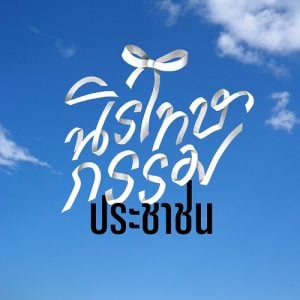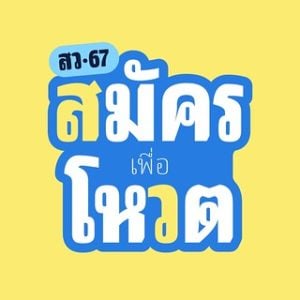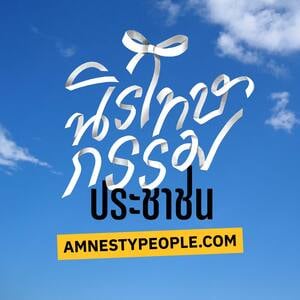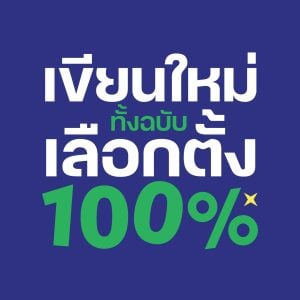On 18 February 2019, Gen.Apirat Kongsompong, an army chief gave interview to the press, saying that “Do you know what is the big hit song at the time? It is ‘scum of the earth.’ “Apart of such statement in his interview the army chief also ordered radio stations which belong to the army to play Patriotic songs such as ‘Scum of the earth’ and Army’s March in its air time.
The speech of the Army chief had been criticized widely. as the song ‘Scum of the earth’ had been used to provoke hates toward student movement and led to the massacre of student at Thammasat University on 6 October 1976. Ekkachai and Chokchai, political activists, who disagree with the speech of the Gen.Apirat then responded by announcing that they will organize and activity “play a song for the army chief” in front of the Royal Thai Army Headquarter.
After they made announcement publicly on Facebook, the two activists later went to held their activity on street isle opposite of the Army Headquater. The police surrounded the area and allowed the two activists to proceed their activity for a while before “invited” them to a police station nearby where they were informed of accusation “failed to notify public assembly to relevant authority” under the Public Assembly Act 2015. Ekkachai and Chokchai denied the charge to the police and that was a beginning of their legal fight.
‘Scum of the earth’ why this song matter?
‘Scum of the earth’ (nak phan din) is the song that written by Col. Boonsong Hakritsuek. It was widely used among the Thai right wing movement since 1975. The song blame those who disloyal to the nation, the monarch or support political ideology that threat to value of the Thai (Communism in the previous context) as ‘Scum of the earth’.
The song had been constantly played through radio stations of the Military Armored Vehicle Unit which was considered as propaganda channel of extreme right wing at the time. The song contributed to provoke hates toward student movements which were seen as pro-Socialist or Communist. The provocation of hates later contributed to the massacre at Thammasat University in the early morning of 6 October 1976.
‘Scum of the earth’ 1975 vs My Country’s got 2018
Statement of the Army Chief was made as a response to Election Campaign of Phue Thai Party prior to 24 March 2019 Election. Sudarat Keyuraphan key figure of Phue Thai party claimed during the party’s election campaign on 15 February 2019 that if it won the election it will create Smart Small Business Center to provide opportunities for start up and it will cut 10% of Defense budget to use in the center. There was also information that the army chief planed to order radio stations that belong to the Army to play such song during the air time. But after his initiative faced criticism he had called off the plan.
Ekkachai and Chokchai, a duo political activist were displeased by statement of the Army chief. Both made comment on their own facebook which can be access by the public saying that they will go to play a song for the Army chief. Ekkachai once posted a message on his Facebook saying that the song “Scum of the earth” was outdated he then planed to play a song “My Country’s got” for the army chief instead of the song ‘Scum of the earth.’ Ekkachai also urged his facebook follower to recommend any song that should be play for Gen. Apirat.
The song “My Country’s got” was co written by a group of individual rappers under special project “Rap Against Dictatorship. – RAD”. Content of the song reflected social and political problems in Thailand including corruption, political violence as well as military interference in politics. The song became ‘talk of the town’ after its music video was released via YouTube on 22 October 2018. Up until 1 October 2019 it has reached 72,634,243 views.
Ekkachai choose to play the song “My Country’s got” because of 2 reasons. First, the song is more related with a current political condition than the previous one. Second, the song “My Country’s got” is also related to the incident on 6 October 1976. Background of the music video was the mocking infamous scene in the 6 October 1976 incident where a man used a chair to hit a dead body that was hung on a tree.
Action under siege
In the morning of 20 February 2019, Ekkachai and Chokchai went to the Army Head Quarter. The police already expected for them and had form a line on the street isle opposite the Army Headquarter, the duo then had to carry on their activity there instead of doing it in front of the “Army Headquarter” sign. Apart from playing a song “My Country’s got” Ekkachai also prepare a special performance for the army chief. He planed to mock the infamous hangman scene of the 6 October 1976 incident, he then prepared a big bear doll to be used as hangman and prepared a chair to hit it. Since Ekkachai and Chokchai arrived at the scene they were surrounded by the police as well as the press. Even the duo were surrounded by the police but they were managed to delivery a song to the army chief as promised. Unfortunately, while Ekkachai tried to use his portable speaker play a song “My Country’s got” the police had seized his big bear doll. Ekkachai then had to pretend to hit Chokchai with a chair instead of the doll.
The duo managed to play their song for a while before the police used their speaker which was designed specifically for crown control operation to play a song “The Ultimate Dream” a composition By King Rama IX. The volume of Ekkachai’s speaker could not compete with police’s speaker, his activity was then implicitly end. The police later “invited” the duo to go to police’s vehicle and drove them to the police station nearby. At the station, the duo were informed of accusation under section 10 of Public Assembly Act 2015 – fail to notify the police regarding the public assembly 24 hours in advance. The sentence for violation of such accusation was only a fine up to 10,000 Baht with no prison sentence. According to the Thai legal system Ekkachai and Chokchai can plea guilty to the police, pay fine then the case would end. However, the duo decided to plea no guilty and willing to stand trial before the court.
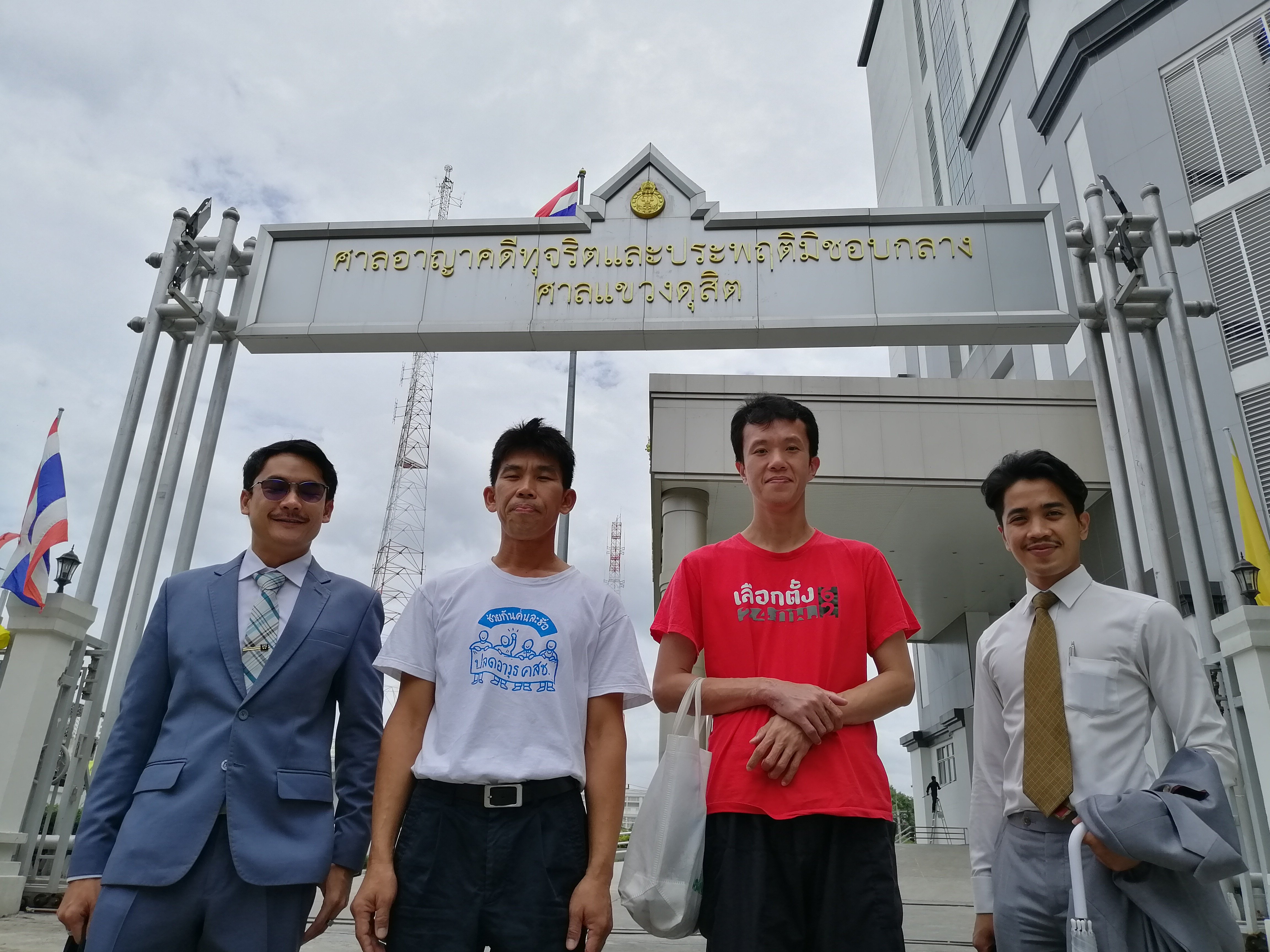
Ekkachai (in red tshirt) and Chokchai (in white tshirt) along with their lawyers in front of Dusit Municipal Court 4 July 2019
Difficulty is a cost to establish legal standard.
The hearing of this case was proceeded between 3 and 4 July 2019, 4 police witnesses testified against the duo while the defendants only had Ekkachai testify as witness. Main arguments of the prosecution including, both defendant posted messages regarding date and venue of the event on their facebook publicly, facebook status posted by the 2 defendants did not provide a message to prevent the public from taking part in their activity, the venue of the event is a public space. The activity in this case then considered as public assembly then organizers of public assembly had a duty to inform the police. Since the defendants did not notify the police they then committed an offense against the law.
As for the defendants, Ekkachai claimed that he posted regarding the activity to the public because it was an agreement that he made with the press and the police intelligence as they constantly asked him regarding his activities he then told them to follow his Facebook status instead of keep asking him. Ekkachai also claimed that on his Facebook status he did not invited anyone to participate in the activity but specifically mentioned name of Chokchai. Ekkachai also claimed that he and Chokchai had organized symbolic activities similar like one in this case such as activity at the Government House where he went to present wrist watch to Gen. Pravit, a former Minister of Defense who faced scandal over a procession of luxury watches. In that activity he did not notify the police and he had never been charge in a similar accusation like this case. Ekkachai also claimed that there was no participant other than him and Chokchai and it was impossible for other to participate because he and Chokchai were surrounded by the police and the press.
Ekkachai revealed that he usually posted message before going to take action in any issue. Every time he would stated clearly whether he will go alone or go with other. Prior to this case he has never notified the police under the Public Assembly Act process as he did not considered it as “public assembly” and he had never been prosecuted under this accusation before. Ekkachai insisted that his activism is just an activity not public assembly.
Ekkachai stated that under accusation in this case, he can simply plea guilty to the police and pay fine instead of go through the trial before the court but he and Chokchai decided to plea no guilty and stand trial before the court which costed both of them time and money because they want to use their case to set up a legal standard, to have a clear distinction between activity and public assembly that need to notify the police. In his opinion, Ekkachai believe that the purpose of notification is to inform the police in advance so they could accommodate needs of the protesters such as security as well as needs of other people who had to pass by the area such as facilitate the traffic. In his opinion Ekkachai think that activity that need to notify the police in advance must had at least 20 participants.
As for Chokchai, he claimed that the activity in this case was not public assembly that aim to have numbers of participants. It was just an activity that he has done with Ekkachai with an aim to send a message to the army chief. He also claimed that should the police allow him and Ekkachai to proceed as they wish, the activity will be finished in a short period of time. Chokchai reasoned similar to Ekkachai regarding the decision to fight the case that he want to set up a legal standard regarding definition of public assembly. He also claimed that number of civil society groups also take action similar to the activity in their case, it is then necessary to draw the line for activities that doesn’t need notification and what are public assembly.
The definition of Public Assembly Act according to section 4 is
Public Assembly mean “The assembly of person(s) in a public space to demand, support or protest or express opinion in any issue to the general public and the public can participate in the assembly whether there was mobilazation in the assembly or not”
_0.jpg)
Ekkachai and Chokchai in action on 20 February 2019 (Photo belong to (Wassana Nanuam)
It is public assembly because no discriminatory message were posted.
On 25 September 2019, the Dusit Municipal Court found Ekkachai and Chokchai guilty under Public Assembly Act 2018. The verdict can be summarized as follow:
The prosecution’s witnesses testified in the same manner that on 18 February 2019 Ekkachai and Chokchai posted messages on their Facebook said that both of them will go to play a song “My Country’s got” in front of the Royal Thai Army Headquarter on 20 February 2019. Facebook status of both can be accessed by the public. On 19 February Chokchai posted message on his Facebook to confirm a venue and time of activity once again while Ekkachai shared the previous message and confirm that he will go ahead with his activity.
On 20 February 2019 Ekkachai and Chokchai appeared in front of the Army Headquarter as announced on their Facebook. Ekkachai bring along a chair, a portable speaker and a bear doll. The police had informed Ekkachai that he did not notify the public assembly to the police in advance. Both however insisted to proceed with their activity.
In its testimony, Ekkachai also testified that he had asked the public to recommend songs that should be played for the army chief. Ekkachai also testified further that he organized activities for 60 to 70 times, his Facebook account had about 10000 followers and all of his posts were set as public post so anyone can access and read his post. The court then believed that Ekkachai and Chokchai were known by the public. The circumstance where both defendants posted messages announce that they will conduct an activity at a certain venue and time then considered as the confirmation of activity. Since both defendants did not made any statement to prevent the public from taken part in the activity it is then considered that such announcement were public invitation.
During the incident even though the defendants were surrounded by the police but the police did not prevent the public from passing by the scene. Moreover, the defendant also used amplifier it is then considered that the activity was the expression that the public can hear or participate. The activity of the defendants then consider as public assembly that need to notify the police in advance.
The defendants are then considered as organizers of public assembly. Since the defendants did not inform the police regarding public assembly the court then found both defendant guilty. Ekkachai and Chokchai are ordered to pay fine in the sum of 2000 Baht each.



